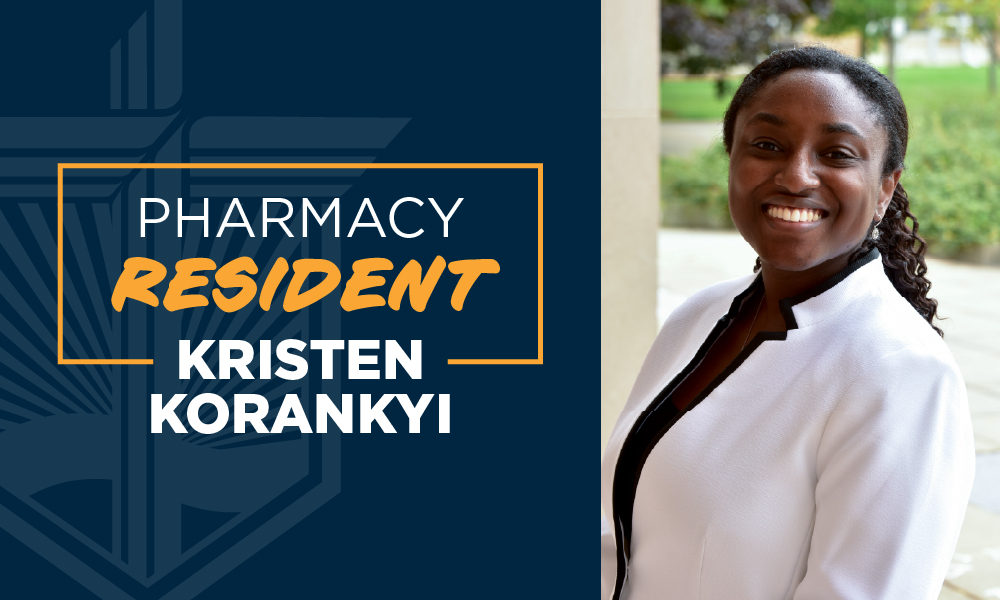
Dr. Kristen Korankyi received her PharmD in 2021 from High Point University’s Fred Wilson School of Pharmacy. She is now a resident in Concordia University’s 24-month Pharmacy Practice and Academic Leadership Resident program. Currently, she practices as an ambulatory care pharmacist at Lakeshore Community Health Care two days a week. For the rest of the week, she serves as an instructor at Concordia’s School of Pharmacy.
In this blog, learn about Kristen’s experiences as she has worked to earn her master’s in education and advance her pharmacy expertise. Dr. Korankyi has found her calling to serve her patients and educate future pharmacists.
Why do you want to have a career as both a pharmacist and instructor?
As a college tutor, I began to realize I really enjoy helping others learn. My diverse background offers a unique perspective to help mentor and educate a variety of students as I’m originally from Ghana, West Africa. Concordia offers one of the only programs I could find for pharmacy and education, and it has proven to be a robust training.
I like that the instructor and pharmacist learning in the Pharmacy Practice and Academic Leadership program run concurrently to each other and are given equal importance. For the education portion, I have spent 25% of my time being an instructor in various courses and labs in the School of Pharmacy. Then, I have dedicated another 25% to instructor-based courses in teaching and learning. For the pharmacist part of the program, I completed my first year of residency at a community health center. Currently, I am finishing up my second year serving in ambulatory care services as a pharmacist.
What were the key lessons for you from the master’s of education program?
I learned how to utilize multimedia in the classroom to create the best learning experience. The curriculum has taught me how to write appropriate learning objectives and assessment questions for courses. I have learned how to create my own personalized educational philosophy as I develop as an instructor. I will be earning a graduate degree in education with an emphasis on teaching and learning.
How have you served as an instructor in Concordia’s School of Pharmacy?
I have been able to instruct in applied patient care labs for first and third year pharmacy students. Within two months of starting as a resident, I coordinated a module on drug information to first-year pharmacy students. Subsequently, this led to a research project which IRB (Institutional Review Board) approved. And that led to me presenting this project as a poster at the 2022 AACP Annual Meeting. This abstract and poster is titled, “Measuring professional confidence and growth mindset in first-year pharmacy students’ drug information responses.” Now, I am working on a full manuscript for a pharmacy journal on this same topic.
I have taught classes for Medical Literature Evaluation, Ambulatory Care Pharmacy, and Pharmacy and the Underserved. In the Pharmacotherapy III course, I had the opportunity to co-coordinate the pulmonary unit. One of my current projects is working on integrating social determinants of health awareness. I am also providing training in a third-year pharmacy applied patient care lab this spring semester.
What are the highlights from your ambulatory care pharmacy residency?
I had the opportunity to participate as a clinical director of a collaborative chronic disease management program. Chiefly, this involved conducting visits that consisted of medication reviews, and reviews of blood pressure and blood sugar readings. It was a great learning experience getting to implement hypertension and diabetes visits for patients.
Another highlight is that I recently wrote an abstract for a podium presentation at a Pharmacy Society of Wisconsin (PSW) event. It was titled, “Integrating interprofessional collaboration into an ambulatory care pharmacy service in a federally qualified health center (FQHC)”. This came from my pharmacy work that I completed at the Lakeshore Community Health Care which is a designated FQCH. For the most part, it is through these patient experiences that I have developed a passion to care for the underserved and uninsured.
Find your vocation in pharmacy
So, maybe being a pharmacy instructor at an academic institution isn’t the thing for you. There are many different ways to serve as a pharmacist, and it can be a bit overwhelming trying to decide the right path for you. Through coursework, labs, pharmacy practice experiences, volunteer opportunities, and more you will find the pharmacy specialization that fits you.
Starting in your first year of pharmacy school, Concordia will have you involved in both hospital and community pharmacist experiences. The on-site experiences in healthcare settings will continue throughout your time in pharmacy school. In your final year of pharmacy school, you will receive first-hand experience in the following pharmacy specializations:
- Community Pharmacy
- Acute Care Medicine
- Hospital/Health System Pharmacy
- Ambulatory Care
Do you have a different pharmacy specialization in mind? Our faculty can get you first-hand experience in any area that interests you. For example, Andrea Thooft, a 2022 PharmD graduate, wanted to pursue work in women’s health and pharmacy. She approached Dr. Bartelme and Dr. LaDisa about doing an independent study course on women’s health. Through their pharmacy network, they set up a custom program for Andrea.